Related Research Articles

Charles Stewart Parnell was an Irish nationalist politician who served as Leader of the Irish Parliamentary Party from 1882 to 1891 and Leader of the Home Rule League from 1880 to 1882. He served as a Member of Parliament (MP) from 1875 to 1891. His party held the balance of power in the House of Commons during the Home Rule debates of 1885–1890.
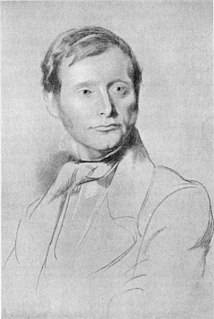
William Edward Forster, PC, FRS was an English industrialist, philanthropist and Liberal Party statesman. His staunch advocacy of lethal force against the Land League earned him the nickname Buckshot Forster.
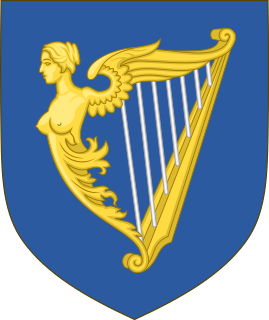
The Irish Parliamentary Party was formed in 1874 by Isaac Butt, the leader of the Nationalist Party, replacing the Home Rule League, as official parliamentary party for Irish nationalist Members of Parliament (MPs) elected to the House of Commons at Westminster within the United Kingdom of Great Britain and Ireland up until 1918. Its central objectives were legislative independence for Ireland and land reform. Its constitutional movement was instrumental in laying the groundwork for Irish self-government through three Irish Home Rule bills.

The Irish National Land League was an Irish political organisation of the late 19th century which sought to help poor tenant farmers. Its primary aim was to abolish landlordism in Ireland and enable tenant farmers to own the land they worked on. The period of the Land League's agitation is known as the Land War. Historian R. F. Foster argues that in the countryside the Land League "reinforced the politicization of rural Catholic nationalist Ireland, partly by defining that identity against urbanization, landlordism, Englishness and—implicitly—Protestantism." Foster adds that about a third of the activists were Catholic priests, and Archbishop Thomas Croke was one of its most influential champions.

John Dillon was an Irish politician from Dublin, who served as a Member of Parliament (MP) for over 35 years and was the last leader of the Irish Parliamentary Party. By political disposition Dillon was an advocate of Irish nationalism, originally a follower of Charles Stewart Parnell, supporting land reform and Irish Home Rule.
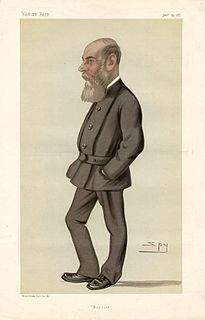
Charles Cunningham Boycott was an English land agent whose ostracism by his local community in Ireland gave the English language the verb "to boycott". He had served in the British Army 39th Foot, which brought him to Ireland. After retiring from the army, Boycott worked as a land agent for Lord Erne, a landowner in the Lough Mask area of County Mayo.

Michael Davitt was an Irish republican activist for a variety of causes, especially Home Rule and land reform. Following an eviction when he was four years old, Davitt's family emigrated to England. He began his career as an organizer of the physical-force Irish Republican Brotherhood. Convicted of treason felony for arms trafficking in 1870, he served seven years in prison. Upon his release, Davitt pioneered the New Departure strategy of cooperation between the physical-force and constitutional wings of Irish nationalism on the issue of land reform. With Charles Stewart Parnell, he co-founded the Irish National Land League in 1879, in which capacity he enjoyed the peak of his influence before being jailed again in 1881.

The Irish Land and Labour Association (ILLA) was a progressive movement founded in the early 1890s in Munster, Ireland, to organise and pursue political agitation for small tenant farmers' and rural labourers' rights. Its branches also spread into Connacht. The ILLA was known under different names—Land and Labour Association (LLA) or League (LLL). Its branches were active for almost thirty years, and had considerable success in propagating labour ideals before their traditions became the basis for the new labour and trade unions movements, with which they gradually amalgamated.
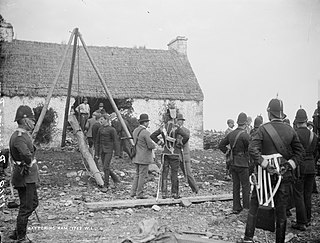
The Land War was a period of agrarian agitation in rural Ireland that began in 1879. It may refer specifically to the first and most intense period of agitation between 1879 and 1882, or include later outbreaks of agitation that periodically reignited until 1923, especially the 1886–1891 Plan of Campaign and the 1906–1909 Ranch War. The agitation was led by the Irish National Land League and its successors, the Irish National League and the United Irish League, and aimed to secure fair rent, free sale, and fixity of tenure for tenant farmers and ultimately peasant proprietorship of the land they worked.
The Parnell Commission, officially Special Commission on Parnellism and Crime, was a judicial inquiry in the late 1880s into allegations of crimes by Irish parliamentarian Charles Stewart Parnell which resulted in his vindication.

John Joseph Clancy, usually known as J. J. Clancy, was an Irish nationalist politician and Member of Parliament (MP) in the House of Commons for North County Dublin from 1885 to 1918. He was one of the leaders of the later Irish Home Rule movement and promoter of the Housing of the Working Classes (Ireland) Act 1908, known as the Clancy Act. Called to the Irish Bar in 1887 he became a KC in 1906.

The Protection of Persons and Property (Ireland) Act, also called the Coercion Act, was an act of the Parliament of the United Kingdom which allowed for internment without trial of those suspected of involvement in the Land War in Ireland. The provisions could be introduced by proclamation of the Lord Lieutenant of Ireland in any area of the island. Lists of internees had to be laid before Parliament.
James Daly was an Irish nationalist activist best known for his work in support of tenant farmers' rights and the formation of the Irish National Land League.

John O'Connor Power was an Irish Fenian and a Home Rule League and Irish Parliamentary Party politician and as MP in the House of Commons of the United Kingdom of Great Britain and Ireland represented Mayo from June 1874 to 1885. He practised as a barrister from 1881.
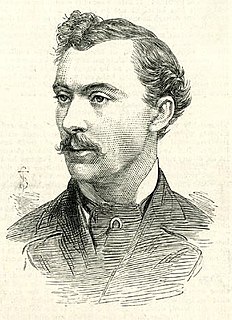
Thomas Brennan, was an Irish Fenian, agrarian radical and co-founder and joint first secretary of the Irish National Land League and signatory of the No Rent Manifesto.
The term New Departure has been used to describe several initiatives in the late 19th century by which Irish republicans, who were committed to independence from Britain by physical force, attempted to find a common ground for co-operation with groups committed to Irish Home Rule by constitutional means. In the wake of the Fenian Rising of 1867 and the unpopular executions which followed it, Fenianism was popularized and became more moderate, while the Home Rule movement was edging toward radicalism at the same time, laying the framework for the alliance. The term was coined by John Devoy in an anonymous article in the New York Herald on 27 October 1878 in which he laid out a framework for a new policy.

The Plan of Campaign was a stratagem adopted in Ireland between 1886 and 1891, co-ordinated by Irish politicians for the benefit of tenant farmers, against mainly absentee and rack-rent landlords. It was launched to counter agricultural distress caused by the continual depression in prices of dairy products and cattle from the mid-1870s, which left many tenants in arrears with rent. Bad weather in 1885 and 1886 also caused crop failure, making it harder to pay rents. The Land War of the early 1880s was about to be renewed after evictions increased and outrages became widespread.

The Irish Home Rule movement was a movement that campaigned for self-government for Ireland within the United Kingdom of Great Britain and Ireland. It was the dominant political movement of Irish nationalism from 1870 to the end of World War I.
The Land Conference was a successful conciliatory negotiation held in the Mansion House in Dublin, Ireland between 20 December 1902 and 4 January 1903. In a short period it produced a unanimously agreed report recommending an amiable solution to the long waged land war between tenant farmers and their landlords. Advocating a massive scheme of voluntary land purchase, it provided the basis for the most important land reform ever introduced by any Government of the United Kingdom of Great Britain and Ireland during the period of the Act of Union (1801–1922), known as the Wyndham Land Purchase Act 1903.
The No Rent Manifesto was a document issued in Ireland on 18 October 1881, by imprisoned leaders of the Irish National Land League calling for a campaign of passive resistance by the entire population of small tenant farmers, by withholding rents to obtain large rent abatements under the second 1881 Irish Land Act. The intention being to "put the Act to the test" and prove its inadequacy to provide for the core demands of the tenants – the 'three Fs' of fair rent, fixity of tenure and free sale – as well as providing sufficient funds for occupier purchase.
References
- ↑ Jane Stanford, That Irishman The Life and Times of John O'Connor Power, pp. 102-111, ISBN 978-1-84588-698-1
- ↑ Russell, Sir Charles, Q.C. M.P. (1889). The Parnell Commission, the Opening Speech for the Defence. New York, London. p. 208.
- ↑ A Dictionary of Irish History, D.J.Hickey & J.E.Doherty, Gill and Macmillan, Dublin, 1980. Pp. page 86. ISBN 0-7171-1567-4
| This article relating to law in Ireland is a stub. You can help Wikipedia by expanding it. |